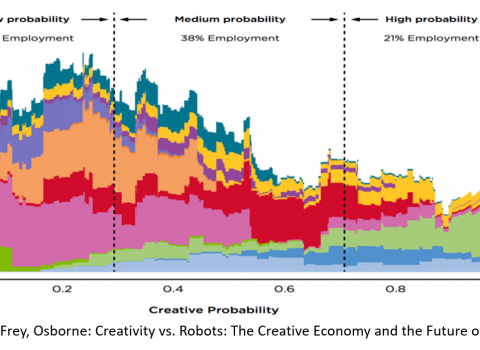
“AI for Future Italy”: challenges of the present and indications for seizing the opportunities available
An open document containing discussions, proposals and recommendations for Italian research in Artificial Intelligence and the connection with institutions, industry and society. Organized by the National Laboratory of Artificial Intelligence and Intelligent Systems of the National Interuniversity Consortium for Informatics
In 2018, FBK shone the spotlight on the macro-theme of artificial intelligence (AI) as a factor of large-scale social change, focusing its attention on the effects of innovation that is progressively introduced in every industrial sector and has an immediate impact on our daily lives.
FBK’s multi-year strategic plan looks at the 2027 horizon by placing these challenges at the center and observing them from a human-centered perspective, so that these technologies can support us, not replace us. For this reason, FBK is part of CLAIRE, the European consortium of research infrastructures for AI, as well as of the National Inter-University Consortium for Informatics (CINI), in both cases since their inception.
The National Laboratory of Artificial Intelligence and Intelligent Systems (AIIS) of CINI recently presented “AI for Future Italy”, a document containing proposals and recommendations for the development of artificial intelligence in Italy.
AIIS is structured as a network of national excellence in the AI domain, with 55 nodes distributed across 47 universities and research institutions, including the National Research Council, the Italian Institute of Technology and Fondazione Bruno Kessler.
CINI recommended that a “control room” for AI would be set up in Italy, that according to CINI experts (over 600, of which about 80 from FBK) should be coordinated by the President of the Council of Ministers’s Office.
Italy should also have a “National 2030 Project” for AI, a program that will provide funding for research initiatives in areas such as the reliability of artificial intelligence, reasoning, decision-making skills including in social contexts.
The document, containing strategic indications for the education and jobs areas, includes KPIs (key performance indicators) useful for evaluating strategy effectiveness. For example, Italian excellence in AI research can be measured in terms of awards, funding, scientific publications, etc.
AI for Future Italy advances the creation of the National Institute in Artificial Intelligence, geographically distributed, with AI laboratories, sections and centers, to better interface AI research with local organizations throughout Italy.
The construction of the document was coordinated by:
- Rita Cucchiara, DIEF, University of Modena and Reggio Emilia,
- Fosca Giannotti, ISTI, National Research Council
- Daniele Nardi, DIAG, University of Rome “La Sapienza”,
- Roberto Navigli, DI, University of Rome “La Sapienza”.
You may follow the link below to listen to a partial recording of the document presentation: https://bit.ly/AIfutureItaly


